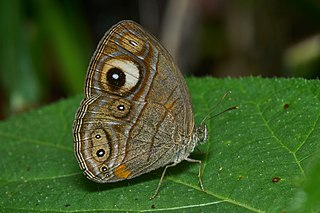
Mycalesis patnia, the glad-eye bushbrown, is a satyrid butterfly found in southern India and Sri Lanka.

Mycalesis oculus, the red-disc bushbrown, is a satyrine butterfly found in southern India. It is similar in markings to Mycalesis adolphei but distinguished by the reddish band around the large apical spots on the upper forewings.

Mycalesis anaxias, the white-bar bushbrown, is a species of satyrid butterfly found in South and Southeast Asia. In South Asia, it inhabits Sikkim, eastwards through the hill-ranges to Assam, Cachar, Myanmar and Tenasserim. Also in southern India, in the Nilgiris and Travancore.

Luthrodes pandava, the plains Cupid or cycad blue, is a species of lycaenid butterfly found in India, Sri Lanka, Myanmar, United Arab Emirates, Indochina, Peninsular Malaysia, Singapore, Taiwan, Java, Sumatra and the Philippines. They are among the few butterflies that breed on plants of the cycad class.

Tanaecia lepidea, the grey count, is a species of nymphalid butterfly found in South and Southeast Asia.

Mycalesis mineus, the dark-brand bush brown, is a species of satyrine butterfly found in Asia.
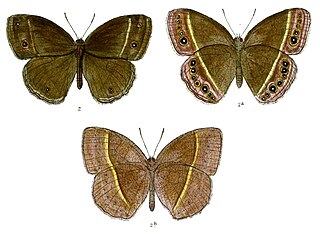
Mycalesis (annamitica) lepcha, the Lepcha bushbrown, is a satyrine butterfly found in Asia. It is not resolved whether it is best considered a distinct species, or included in Mycalesis annamitica. It was formerly included in Mycalesis malsara.
Mycalesis nicotia, the brighteye bushbrown, is a species of satyrine butterfly found in Asia.

Petrelaea dana, the dingy lineblue, is a species of lycaenid butterfly found in Indomalayan realm.

Junonia almana, the peacock pansy, is a species of nymphalid butterfly found in Cambodia and South Asia. It exists in two distinct adult forms, which differ chiefly in the patterns on the underside of the wings; the dry-season form has few markings, while the wet-season form has additional eyespots and lines.It is listed as Least Concern in the IUCN Red List.

Athyma nefte, the colour sergeant, is a species of brush-footed butterfly found in tropical South and Southeast Asia.

Cethosia nietneri, the Tamil lacewing, is a species of nymphalid butterfly found in Sri Lanka and south India. The species name is after John Nietner who obtained specimens of the butterfly from Ceylon from which it was described.
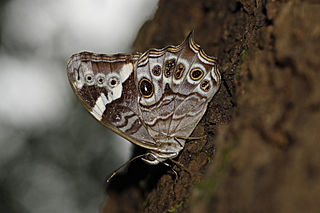
Lethe rohria, the common treebrown, is a species of satyrine butterfly found in Asia.

Lethe drypetis, the Tamil treebrown, is a species of Satyrinae butterfly found in south India and Sri Lanka.

Lethe europa, the bamboo treebrown, is a species of Satyrinae butterfly found in Asia.

Ypthima baldus, the common five-ring, is a species of Satyrinae butterfly found in Asia.

Vindula erota, the common cruiser, is a species of nymphalid butterfly found in forested areas of tropical South Asia and Southeast Asia.
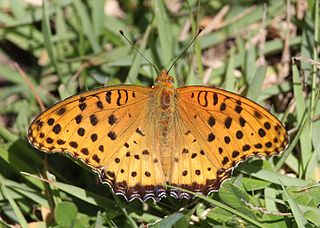
The Indian fritillary is a species of butterfly of the nymphalid or brush-footed family. It is usually found from south and southeast Asia to Australia.

Junonia iphita, the chocolate pansy or chocolate soldier, is a butterfly found in Asia.
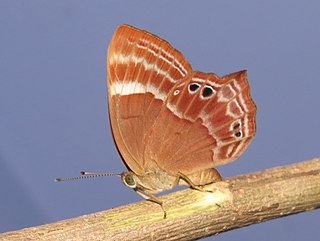
Abisara bifasciata, the double-banded Judy or twospot plum Judy, is a butterfly in the family Riodinidae. It is found in Asia.




















